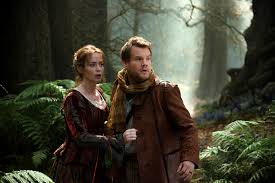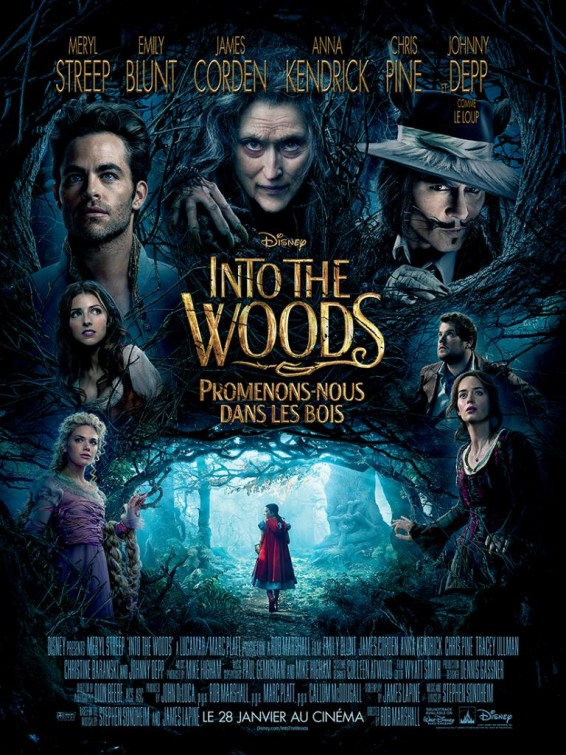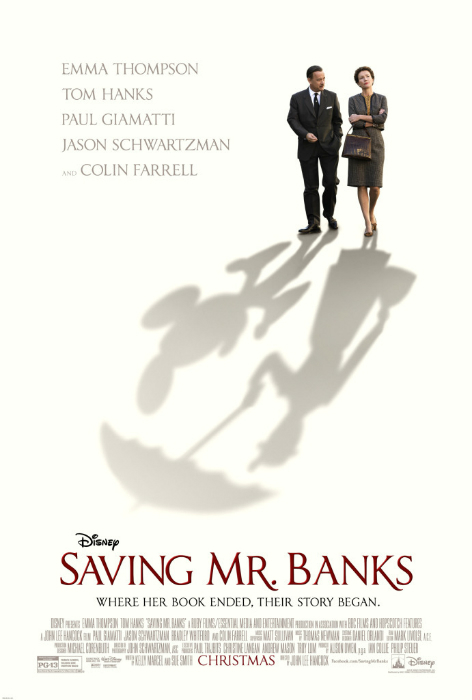The first half of Into the Woods plays out as an enjoyable and funny, Princess Bride-esque type of fairy tale mashup. However, before “happily ever after” has a chance to settle in, the second half of the movie kicks in, which works to undo all of the fairy tale standards and tropes set up by the first half. It’s here where the true nature of the woods is revealed, and it’s not a pleasant place. Turns out the woods is a place of moral relativism and completely lacking in absolute truth. It’s a place where silly things like good and evil, true and noble, and “happily ever after” are childish and simplistic notions, which pose a danger of corrupting young and impressionable minds. It’s a twisted and a dark path, into the woods, one that’s also filled with a surprisingly lecherous subtext, all of which makes this latest Disney fairy tale one that’s perhaps best avoided by families looking for a holiday outing.
Not that this is a poorly made film. In fact, there’s quite a bit about it that I actually enjoyed. Meryl Streep is a blast to watch as the witch at the center of all that takes place. Chris Pine, however, absolutely steals the show in all his scenes. He’s so over the top that that actor who plays Captain Kirk is actually more of the William Shatner Captain Kirk in this movie than in the two previous Star Treks, which makes for a delightfully funny spectacle every time he’s on screen. These are the two standouts in a cast that is solid from top to bottom. Toss in some enjoyable music (it is a musical after all), solid production design, and clever writing, and you have the makings of a fun movie. However, all is not what it seems in the woods, and what might seems like another playful send-up of the Disney-fied fairy tale formula actually treads into much darker and more dangerous territory.
Even in the sunny, cheery, more standard fairy tale-like beginning, one can tell that not everything is quite right in the woods. There was some very subtle subtext to the Wolf’s encounter with Red Riding Hood that made me feel rather uncomfortable with the fact that I had brought my twelve-year-old daughter to the screening. While I’m certain she didn’t notice it, I did, and it made me squirm ever so slightly. From what I’ve read and heard, the popular musical the film is based isn’t quite so subtle with those elements, which actually had some complaining that Disney would ruin the story by removing them, especially since they were so integral to the story this particular musical was trying to tell. I also mentioned to my daughter that she should take note of what color horse Prince Charming was riding (it was black), as that would be important later on. It was, but my daughter was no less shocked and upset by the revelation.
Still, it’s the second half of the movie where it really sets out to trample the ideals of classic fairy tales. As our characters get “educated” in the woods, they learn that it’s up to them to determine what is good, that no one can know what is True, and that everyone has their own, valid opinion and it’s important to not only acknowledge but be accepting of every viewpoint. You may think that I’m reading between the lines with this, but some of that are direct quotes from the movie. As much as the muted sexual subtext made me slightly uncomfortable, these kinds of bold statements outright alarmed me. In fact, this was probably the peachiest movie I’ve seen in quite some time, and it was bludgeoning the audience with a morally relativistic, anti-absolute, always be tolerant of everything and everyone worldview.
Of course the fascinating thing was even as the film preached tolerance and moral relativism, characters still felt “wronged” (how is that possible if right and wrong don’t really exist), and they still slayed giants despite the fact they just stated that maybe they were just as justified in their rampant destruction as the kingdom was in trying to defend themselves.  The film demonstrates that moral relativism and a lack of absolutes is an untenable way for the world to function even as it trumpets that’s how the world should function; even the world of fairy tales. Jesus once stated that “broad is the road that leads to destruction…” so I find it interesting that even as Into the Woods preaches a very broad worldview, the film ends in the midst of devastation and destruction. The kingdom is destroyed, marriages are destroyed, lives are destroyed, and even the woods are destroyed. So what exactly was so “wrong” about having the “narrow” view that good and evil, right and wrong, True and false aren’t relative?
The film demonstrates that moral relativism and a lack of absolutes is an untenable way for the world to function even as it trumpets that’s how the world should function; even the world of fairy tales. Jesus once stated that “broad is the road that leads to destruction…” so I find it interesting that even as Into the Woods preaches a very broad worldview, the film ends in the midst of devastation and destruction. The kingdom is destroyed, marriages are destroyed, lives are destroyed, and even the woods are destroyed. So what exactly was so “wrong” about having the “narrow” view that good and evil, right and wrong, True and false aren’t relative?
I find it interesting that this Christmas season, families have a choice between two very different musical movie outings. There’s this film, Into the Woods, which pretty much lays waste to all the “old fashioned” ideals of classic Disney fairy tales, and there’s Annie, which is brimming full of optimism and the belief that virtue is its own reward is good is worth doing simply because it’s right and that the bad guys get what’s coming to them and the good guys always win…you know, all that “old fashioned,” feel good stuff. The final song of Into the Woods warns that one should be cautious in the tales that are told to children, because they will believe it (implying it’s a cruel deception to tell tales of good and evil and happily ever after). Well, I couldn’t agree more, so heed my warning dear families, do not go Into the Woods. It’s a dark and twisty path with a subtext that seems determined to undermine all that the Bible has ever taught.



